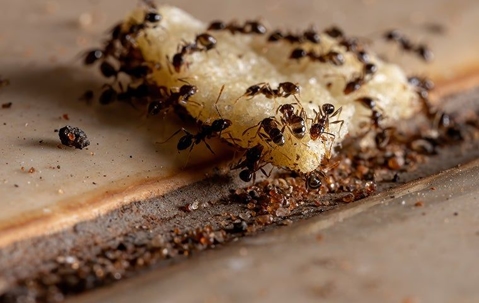As a homeowner in Texas, it can sometimes feel like a never-ending struggle to keep pests away and prevent them from wreaking havoc on your property. So, when you notice those creepy crawlies running around in your home, your first reaction would likely be to purchase a strong chemical pesticide to eliminate the problem quickly.
Here’s the reality, though: the use of harsh chemicals in and around your home is dangerous. Taking non-chemical actions to prevent bugs from breaking into your home is safer and more effective.
Keep reading to learn why a traditional pest control approach should never be your first reaction to a pest problem (and why a eco-friendly home pest control or commercial pest control plan should!)
The Problem With Traditional Pest Control Products
The U.S. Department of Health and Human Services (HHS) reports that more than 1 billion pounds of pesticides are used every year in the United States. This is unnerving considering that common pesticides, such as fluoride, are highly toxic and have been shown to result in a laundry list of health and environmental problems.
Health Risks Associated With Pesticide Exposure
Any amount of pesticide exposure can be harmful to our health as it can cause both acute (immediate) and chronic (long-term) health effects.
Some of the commonly diagnosed acute health problems associated with pesticide exposure include stinging eyes, rashes, blisters, blindness, nausea, dizziness, and diarrhea. Chronic complications like cancers, congenital disabilities, reproductive harm, neurological and developmental toxicity, immunotoxicity, and endocrine system disruption have also been linked with pesticides.
Pesticide exposure can be just as dangerous to your pets as it can cause health problems, including fever, vomiting, diarrhea, seizures, dizziness, convulsions, intense abdominal pain, and respiratory failure.
Environmental Impact Of Pesticides
Even when used in controlled doses and applied to small, targeted spaces, toxic pesticides WILL be released into the environment through air, soil, or water. Because some pesticides can persist in the environment, they can remain there for years and spell troubles for our delicate ecosystem.
For example, pesticide use has been associated with a decline in bee colonies or beehives. Pesticide use could also have a devastating effect on other wild pollinators, including wasps, beetles, flies, butterflies, moths, birds, and even some non-flying mammals.
Green Pest Control
Looking at the many health and environmental consequences of pesticides, spraying these toxic chemicals in and around your home to get rid of bugs is just not worth it. This is where we come in.
At Green Pest Guys, we can help exterminate a pest infestation without bringing any harmful chemicals into your home and property. Our pest control program includes products with the least amount of toxicity. This includes natural, organic repellents such as Wintergreen, Rosemary, Thyme, and botanical-based products such as those derived from the chrysanthemum flower. This combination of products allows us to remove pests from your home safely and effectively.
Benefits Of Green Pest Control
We talked about how our green pest control methods are intended to solve pest problems while minimizing hazardous effects on humans and the environment. But there are other good arguments for why organic repellents are always a more suitable choice than traditional pest control products.
Better (More Long-Term) Results
While green pest control methods are just as effective in pest extermination as pesticides, they often have better long-term success rates.
For example, did you know that pests could build up resistance to chemicals used in pesticides? This immunity from treatment could be passed on to the offspring, making it much more difficult to combat a pest problem. On the other hand, organic pest control solutions do not allow pests to develop resistance at all.
Also, green pest control methods tackle the underlying cause of a pest infestation, making it that much more likely that you will not have to encounter the same issue down the line.
Won’t Damage Landscaping
Traditional pest control products need to be re-applied to the target areas every month or so. Spraying these toxic substances in and around your home over and over again is not only harmful to your health but also your landscaping.
Harsh chemicals used in pesticides often cause your turf, shrubs, and plants to shrivel up and die. In addition, as these chemicals can remain buried in your soil for a long time, you may find it very difficult to restore your lawn to the dense, green space it used to be.
Does Not Harm Your Pets
Green pest control methods are specifically targeted to avoid killing every living organism exposed to the treatment — the same cannot be said for traditional pest control products. This is particularly important for your furry friends. By taking non-chemical actions to exterminate pests, your beloved pet will not be at risk of ingesting potentially fatal toxic substances.
No Strong Smell
Traditional pest control products will linger in your home long after the application. These products have a harsh smell and leave you and your family breathing in the air laced with hazardous chemicals. Natural, organic pest control methods, on the other hand, have a pleasant odor and do not linger or spread in your home.
Our Eco-Friendly Approach To Pest Control
Since 2010, our team at Green Pest Guys has been dedicated to providing the best green pest control services to Austin, Dallas, and North Houston homeowners. We use an integrated pest management strategy that is 100% safe and effective.
Contact us today to get started!

